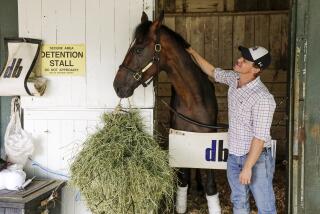Track Coach DeBus Agrees to 2-Year Ban
- Share via
Embattled track coach Chuck DeBus agreed Wednesday to stay out of the sport for two years after reaching a settlement with The Athletics Congress, the domestic governing body for track and field.
DeBus, who has been accused of providing performance-enhancing drugs to athletes, did not admit to any wrongdoing but will not be allowed any contact as an “athlete, coach, agent, manager, official or trainer” in track and field from Oct. 1 to Sept. 30, 1991.
The deal was announced on the day DeBus was to have gone before a TAC-appointed panel to hear evidence of the drug allegations. The hearing was canceled when the agreement was reached, but the deal was not without its own controversy.
Members of the three-person panel from TAC’s Board of Review did not learn of Wednesday’s cancellation until late Tuesday.
They were also apparently left out of the settlement.
Even as TAC was releasing the terms of the agreement to reporters Wednesday, panel members Julie McKinney and Rich Nichols said that they were unaware that a deal had been made between TAC representative Alvin Chriss and Craig Dummitt, DeBus’ attorney.
“The panel hasn’t discussed anything,” Nichols, a San Francisco attorney, said. “I’m looking into the matter. I’m surprised. Obviously, I thought we would have been more involved. I’m waiting to hear what has happened.”
Nichols said he received a copy of the two-page agreement Wednesday morning but had spoken only briefly with William Hickman, chairman of the panel. Nichols said he didn’t know if a majority vote of the panel was required to certify the agreement.
“I’m looking at the bylaws to determine if this is possible,” he said. “I’m surprised by all of it, in the face of the fact that the whole drug issue right now is pretty important. The whole issue of processes in TAC are at the forefront now. Given all that, I’m surprised at this. I like to follow processes. There are some cogent fairness issues that should be followed by a hearing panel.”
McKinney, of San Pedro, heads the TAC women’s long distance running committee. She said Wednesday afternoon she had not even seen a copy of the agreement.
In fact, the president of TAC, Frank Greenberg, had not signed the document by early evening. “But I plan to,” Greenberg said.
Dummitt said he was satisfied with the deal but was not completely sure it was closed.
“I don’t even think Hickman has decided,” he said. “This is not my end of the process. I’m not familiar with TAC’s internal workings. I don’t know if technically it is approved.”
Chriss said Wednesday that the panel members would “work it out” Wednesday night.
The agreement appears to be a compromise in a matter that has been prickly from the beginning. DeBus, 44, coached the L.A. Track Club to nine women’s titles between 1972 and 1982. He coached the UCLA women’s track team to the national title in 1975 and won three straight national championships while at Cal State Northridge from 1978-1980.
Olympic sprinter Diane Williams said earlier this year that DeBus gave her performance-enhancing drugs and distance runner Mary Slaney said DeBus advised her to take the drugs to keep up with the rest of the world. DeBus has consistently denied having dispensed drugs or having advised athletes to use them.
Still, TAC had received enough evidence to launch the investigation, in which Chriss traveled around the country gathering information. He said he collected about a dozen depositions in the case. There seemed to be a distinct fall-off, however, between those who were willing to give sworn statements and those who would agree to appear in a public hearing.
As the hearing date approached, either the evidence began to pale or the witnesses grew more reluctant.
“Nobody would come forward,” Chriss said. “Nobody would come forward to tell what a monster he was, despite what they say. I wanted to know what happened in 1988, not old news.”
Greenberg said that because of TAC’s two-year statute of limitations, much of the evidence against DeBus would not be applicable.
Apparently, it was in the best interest of both parties to avoid a public hearing. TAC apparently feared that DeBus would reveal embarrassing information at a time when the sport is taking a heavy public-relations beating. And TAC was threatening to expose DeBus as a drug-coach, although it never publicly divulged any of its evidence.
Dummitt denied that any side deals have been made, although the agreement stipulates that no documents pertaining to the investigation be released. Also, all parties involved are to make no public statements on the matter.
The agreement describes DeBus as having “resigned” from the sport for two years. After that period DeBus may apply for reinstatement. After May 1, 1990, DeBus may work with athletes, provided he furnishes the name of each athlete to TAC.
More to Read
Get our high school sports newsletter
Prep Rally is devoted to the SoCal high school sports experience, bringing you scores, stories and a behind-the-scenes look at what makes prep sports so popular.
You may occasionally receive promotional content from the Los Angeles Times.







